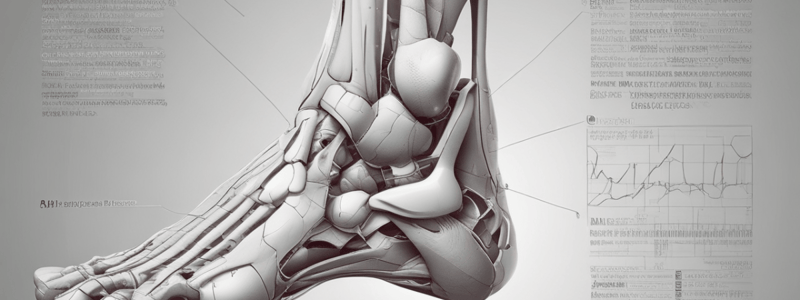Podcast
Questions and Answers
What is the primary function of retinacula in the ankle?
What is the primary function of retinacula in the ankle?
- To provide articulatory surfaces for bones
- To stabilize the joint through ligaments
- To prevent bow stringing of tendons (correct)
- To facilitate dorsiflexion and plantar flexion
Which bone articulates superiorly and medially in the ankle joint?
Which bone articulates superiorly and medially in the ankle joint?
- Fibula
- Calcaneus
- Tibia (correct)
- Talus
What type of synovial joint is the proximal tibio-fibular articulation?
What type of synovial joint is the proximal tibio-fibular articulation?
- Pivot joint
- Ball-and-socket joint
- Hinge joint
- Planar joint (correct)
Which ligament is responsible for supporting the medial side of the ankle joint?
Which ligament is responsible for supporting the medial side of the ankle joint?
What is the name of the joint that allows for both dorsiflexion and plantar flexion?
What is the name of the joint that allows for both dorsiflexion and plantar flexion?
How many ligaments form the distal tibio-fibular syndesmosis?
How many ligaments form the distal tibio-fibular syndesmosis?
What is the function of the tendons of tibialis posterior and flexor digitorum longus in relation to the deltoid ligament?
What is the function of the tendons of tibialis posterior and flexor digitorum longus in relation to the deltoid ligament?
What is the function of the subtalar joint?
What is the function of the subtalar joint?
What is the name of the ligament attached to the lateral malleolus and the lateral surface of the calcaneus?
What is the name of the ligament attached to the lateral malleolus and the lateral surface of the calcaneus?
How many articulations are present between the talus and calcaneus?
How many articulations are present between the talus and calcaneus?
What is the shape of the dorsal surface of the talus?
What is the shape of the dorsal surface of the talus?
How many phalanges are present in the foot?
How many phalanges are present in the foot?
What is the name of the arch that runs transversely across the foot?
What is the name of the arch that runs transversely across the foot?
What is the movement of the ankle joint that allows for the broader anterior portion of the trochlea of the talus to occupy the whole mortise of the joint?
What is the movement of the ankle joint that allows for the broader anterior portion of the trochlea of the talus to occupy the whole mortise of the joint?
How many tarsal bones are present in the foot?
How many tarsal bones are present in the foot?
Flashcards are hidden until you start studying
Study Notes
Ankle Joint
- The ankle joint is composed of three bones: the tibia, fibula, and talus.
- The tibia articulates superiorly and medially, while the fibula articulates laterally.
- The talus provides the inferior articulatory surface.
- Retinacula in the ankle prevent bowstringing of tendons.
Articulations of the Tibia and Fibula
- There are three articulations: proximal, intermediate, and distal.
- The proximal articulation is a planar type of synovial joint.
- The intermediate articulation is an interosseous membrane, syndesmoses.
- The distal articulation is a tibio-fibular syndesmosis, a fibrous joint stabilized by two ligaments: the anterior and posterior distal tibio-fibular ligaments.
The Ankle Joint
- The ankle is a hinge synovial joint, also known as a ginglymus.
- It is a rolling hinge joint that allows both dorsiflexion and plantar flexion.
Ligaments of the Ankle
- The deltoid ligament supports the medial side of the joint, attaching to the medial malleolus and inserting into the calcaneus and navicular tuberosity.
- The deltoid ligament has both a superficial and deep component, with anterior, middle, and posterior fibers.
- The anterior and posterior talofibular ligaments support the lateral side of the joint from the lateral malleolus of the fibula to the dorsal and ventral ends of the talus.
- The calcaneofibular ligament is attached at the lateral malleolus and to the lateral surface of the calcaneus.
Osteology
- The talus has a head, neck, and body, with a concave dorsal surface (trochlear) and a medial and lateral crest at each edge.
- The talus articulates with the calcaneus to form talo-calcaneal joints, also known as sub-talar joints.
- The subtalar joint allows side-to-side motion of the foot (inversion and eversion) and forms the 3-part sub-talar joint.
- The subtalar joint allows 30° of inversion and 15° of eversion.
Arches of the Foot
- There are three arches present at birth.
- The two main arches run antero-posteriorly: the medial longitudinal arch and the lateral longitudinal arch.
- There is one transverse arch.
Ankle Movement
- Dorsiflexion occurs when the broader anterior portion of the trochlea of the talus occupies the whole mortise of the joint, achieving maximal stability.
Studying That Suits You
Use AI to generate personalized quizzes and flashcards to suit your learning preferences.



